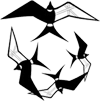![]() International Vulture awareness Day
International Vulture awareness Day
[The Namibian
– 25 August 2011]
Of the 23 vulture species worldwide, none can be viewed as a common bird species. Many are in the conservation classes of vulnerable to threats or already endangered and some species' populations are in a critical situation. Within the Namibian borders, seven vulture species have been recorded. Three species are very rarely seen with the population of Cape Vultures in Namibia classified as critically endangered and close to extinction.
The future for large scavenging birds of prey is conservation dependent. In Namibia, irresponsible and indiscriminate use of chemical poisons to eliminate predators on livestock farmlands has been identified as the most devastating threat to vultures. This type of ecologically unsound farm management is deemed unethical by many groups.
Most people understand the negative consequences of poisons entering the food chain and killing primary, secondary and even tertiary victims. Poison deaths even besides being cruel are more than often unable to be target specific even for the primary victim.
Namibia's is a meat producing country with a responsibility to us and our market to supply clean and ethically sound produce. In today’s “green” world ethical farming besides being essential for the safety of our biodiversity is an economically positive marketing strategy.
An International
Vulture Awareness Day was declared in 2009. This year it will be celebrated
on 3 September 2011. Check out www.vultureday.org
to see what the world’s vulture conservationists and friends are
doing.
 Liz
Komen
Liz
Komen
NARREC